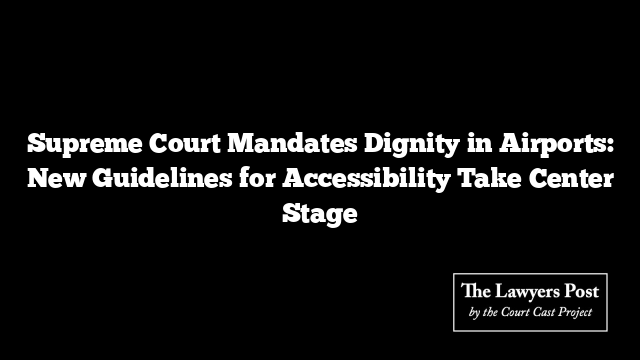The Supreme Court has issued a pivotal directive to ensure airports across India uphold dignity and respect for passengers requiring assistance, particularly individuals with disabilities, the elderly, and those with injuries. The move follows a petition by Arushi Singh, who brought attention to the dehumanizing experience she faced at Kolkata Airport earlier this year.
Singh, an accomplished legal scholar, recounted being left stranded without assistance for 20 minutes and repeatedly asked to stand despite her disability, highlighting systemic insensitivity during security procedures.
The court, emphasizing the necessity of compassion and professionalism, adopted comprehensive guidelines proposed by the Union Government, making them mandatory for implementation. These measures aim to transform how airports cater to passengers requiring special assistance.
Key Accessibility Enhancements
- Real-Time Wheelchair Accessibility App: A mobile application will provide updates on wheelchair availability, streamlining assistance for passengers in need.
- Mechanized Wheelchairs: Airports must maintain a supply of mechanized wheelchairs to ensure mobility for solo travelers and mitigate delays in assistance.
- Personalized Boarding Passes: New boarding passes will feature codes and color scales to communicate the nature and severity of disabilities, facilitating smoother interactions with staff.
- Integrated Disability Databases: Ticket booking platforms will incorporate the Unique Disability Identity Database, enabling automated and verified assistance tailored to travelers’ needs.
- Accessible Kiosks: Specialized kiosks equipped with voice recognition will allow passengers with disabilities to access boarding passes independently.
- Staff Sensitization: Airport personnel will undergo regular training to understand and address the diverse challenges faced by passengers with disabilities, ensuring compassionate assistance.
Extending Dignity Beyond Disabilities
The court stressed that these measures must also benefit elderly passengers and those with temporary injuries requiring wheelchair assistance. Importantly, existing physical support systems at airports will not be reduced; instead, they will be enhanced to complement the new guidelines.
This ruling signals a paradigm shift in accessibility standards, reinforcing the principle that no passenger should feel disrespected or marginalized while traveling. The emphasis on training and infrastructure upgrades reflects a long-term commitment to creating inclusive spaces in one of the country’s most crucial sectors.
The judgment stands as a clarion call for greater empathy and efficiency in addressing the needs of vulnerable travelers, ensuring their journeys are met with respect and dignity at every step.





